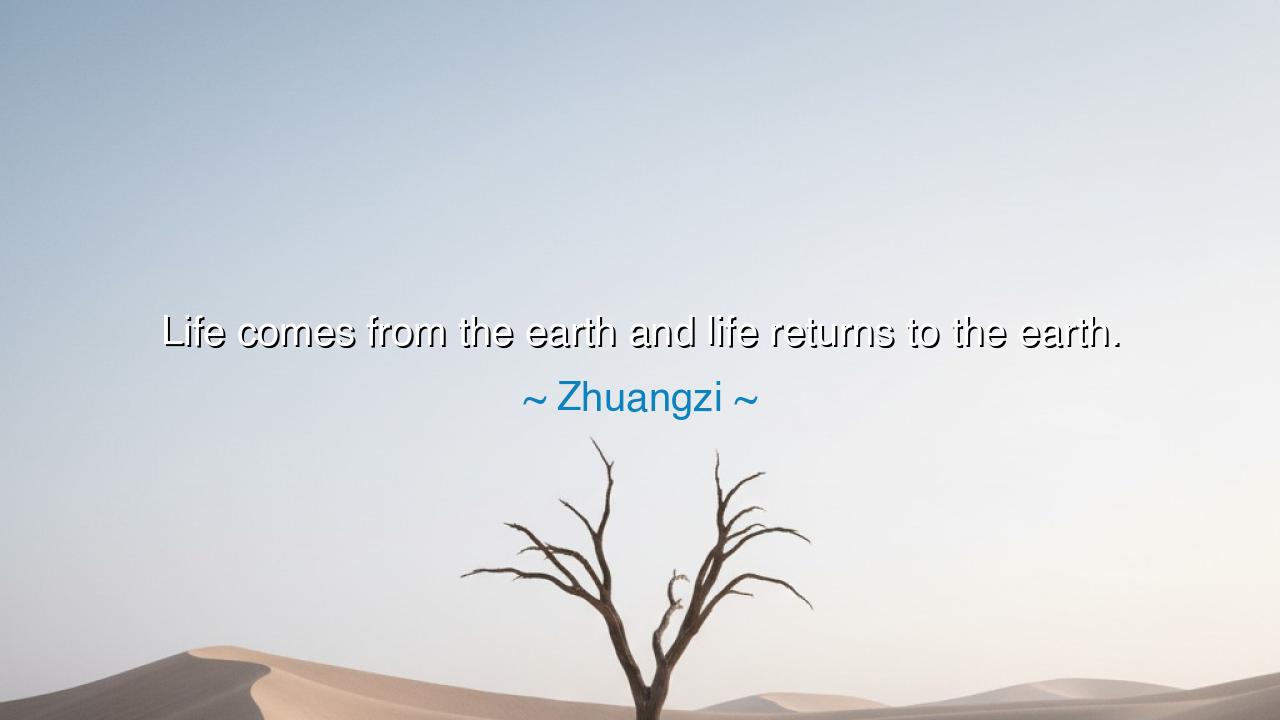
Life comes from the earth and life returns to the earth.






“Life comes from the earth and life returns to the earth.” — so spoke Zhuangzi, the sage of ancient China, whose laughter and wisdom danced together like wind and water. These few words carry the simplicity of nature and the depth of eternity. They remind us that all things, no matter how great or small, are bound by the same sacred rhythm — the cycle of birth and death, of rising and falling, of giving and returning. Zhuangzi, whose teachings shaped the heart of Daoist philosophy, saw life not as a straight road toward some distant goal, but as a circle — unbroken, eternal, ever-renewing. In this circle, there is no true end, for death is not destruction, but transformation.
The origin of this quote lies in Zhuangzi’s reverence for the natural world and his understanding of the Dao, the Way — that vast, invisible current that flows through heaven, earth, and all living things. For him, to live wisely was to live in harmony with this current, to accept both growth and decay as parts of the same divine order. “Life comes from the earth,” he says — for we are born of the soil, nourished by its fruits, shaped by its breath. And “life returns to the earth” — for in the end, we yield our bodies back to the same ground that bore us. There is no tragedy in this, only balance. The wise do not mourn the falling leaf, for they know it will feed the tree again come spring.
To Zhuangzi, death was not to be feared, for it is the mirror of life. He told the story of a man who, upon the death of his wife, at first wept bitterly, then began to sing and beat his drum. His friends were shocked and asked how he could rejoice after such loss. Zhuangzi replied, “Before she was born, there was not life, nor form, nor spirit — now she has returned to that great source. Why should I grieve? It is the way of things.” This story reveals the spirit behind the quote — that sorrow, though natural, blinds us when it refuses to see beyond the moment. The earth gives and takes, but she never steals. What returns to her is not lost; it is renewed in another form.
This truth can be seen not only in the wisdom of sages, but in the rhythm of the world itself. The river that dries feeds the clouds; the clouds fall again as rain. The seed buried in darkness breaks forth into light. Even the fallen warrior, lying in dust, becomes part of the grass that feeds the deer. The cycle of life is both humble and divine — and those who resist it suffer, while those who accept it find peace. To understand that we come from the earth and return to it is to understand that nothing in existence is wasted, and that even death is but another name for change.
In our modern world, we have forgotten this truth. We build walls to separate ourselves from nature; we speak of death as an intruder, rather than as an ancient friend. Yet the earth continues her silent teaching: every sunrise is born from night, every harvest from decay. Even the stars, when they die, scatter the dust that forms new worlds. The great cycle continues, indifferent to our fear, yet generous in its wisdom. Zhuangzi would tell us to look to the soil beneath our feet and remember — we belong to this cycle, not above it. To live well is to live with humility, to tread lightly, and to honor the ground that will one day cradle our rest.
Consider the life of Laozi, Zhuangzi’s spiritual forefather. It is said that when he departed from the world, he rode alone into the western mountains, leaving no tomb, no monument, no temple — only his teachings, like footprints in the dust. He sought not immortality of flesh, but the eternity of harmony. For he knew that the body must fade, but the spirit, like the Dao, endures. His departure, like Zhuangzi’s words, was a return — not an ending, but a homecoming. Those who truly understand this cease to cling and begin to flow, like rivers returning to the sea.
So, my child, learn this lesson from the old masters: do not fear your return to the earth, for it is not your undoing, but your fulfillment. While you live, live fully — breathe deeply, love deeply, and walk with gratitude upon the soil that bears you. When you suffer loss, remember that what departs is not gone, but changed. When you look upon the land, see not dirt and dust, but the sacred womb of creation itself.
For life comes from the earth and life returns to the earth — and in that return lies not sorrow, but serenity. The leaf falls not to die, but to feed the roots. The wave breaks not to vanish, but to join the sea. And so it is with you: you are part of this eternal dance, this boundless circle of becoming. To know this, and to live in harmony with it, is to walk the Way — the ancient, endless Dao — with peace in your heart and eternity in your breath.






AAdministratorAdministrator
Welcome, honored guests. Please leave a comment, we will respond soon